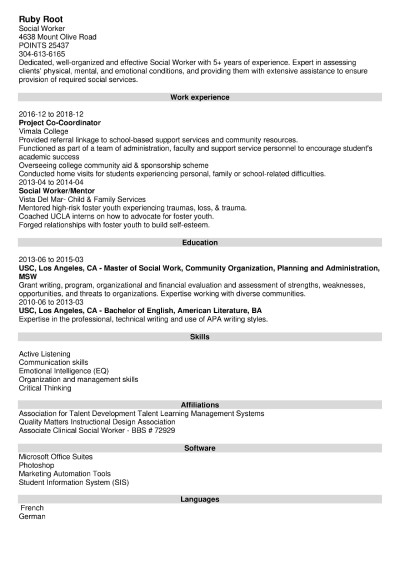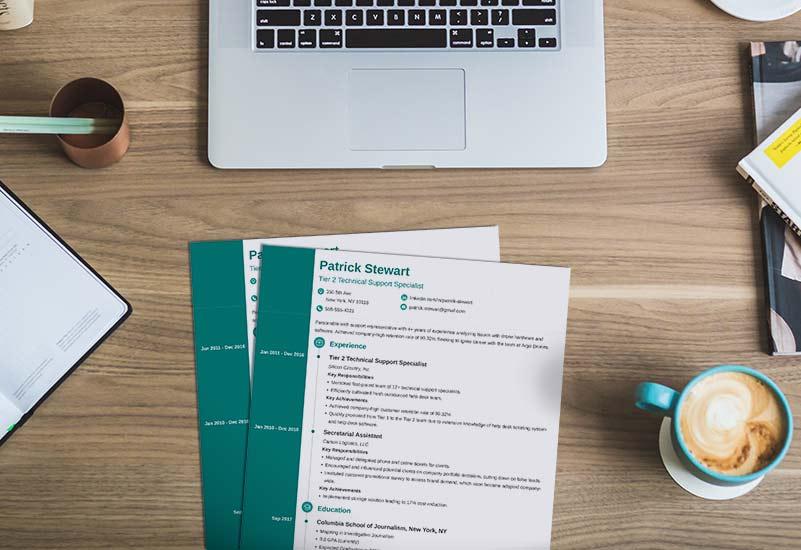
(Active) Listening Skills: Definition, Examples, Techniques
This active listening skills guide can get you hired.
How?
By answering:
Why is listening important on a resume?
And—
How to prove your listening skill set so employers want to hire you.
Do it right, and you’ll be listening to, “How soon can you start?”
This guide will show you:
- The answer to why is active listening important?
- How to show active listening skills on your resume to impress.
- Dozens of great resume active listening examples for top careers.
- How to improve listening skills to get better jobs.
Want to save time and have your resume ready in 5 minutes? Try our resume builder. It’s fast and easy to use. Plus, you’ll get ready-made content to add with one click. See 20+ resume templates and create your resume here.
Sample resume made with our builder—See more resume examples here.
- Communication Skills for Your Resume & Workplace Success
- Management Skills You Must Have (Not Just For Managers)
- Critical Thinking Skills in the Workplace & Everyday Life
- Creative Thinking Skills that Will Boost Your Career
- Computer Skills Employers Want
- Writing Skills for Your Resume and Everyday Job
- Analytical Skills that Employers Value
1
What is Active Listening?
Active listening is what it sounds like: making an effort to listen. With active listening, the listener tries to feel what the speaker is feeling.
To do it, focus on the speaker’s words, then repeat their message back to them. Finally, let the speaker correct your summary until you get it right.
Many think listening is a natural activity which people do without effort.
But—
Hear vs listen are two different things.
Hearing is just receiving sounds. Listening is working to understand them.
There are five active listening skills steps:
How to Become an Active Listener
- Pay Attention. Look at the speaker. Don’t think of arguments. Listen attentively.
- Don’t Judge. Don’t interrupt. Don’t think of right or wrong.
- Restate. Paraphrasing a speaker’s words and feelings is known as reflective listening. It’s the key to being a good listener.
- Ask Questions, especially if you don’t understand.
- Talk. When the speaker knows you get it, share your views.
Then, repeat the attentive listening process when the speaker speaks again.
Active Listening Example
A coworker says:
I don’t like the way you’re delivering your work. It’s in the wrong format. I have to spend a lot of time correcting the layout.
You think:
Ugh. That’ll take a lot of work!
You say:
So you’re having to take extra steps because of the way I’m delivering my work. Is that right?
The coworker thinks:
Okay. He gets it. Now we can talk about how he sees the problem.
Why is Active Listening Important?
Active listening skills are central to most jobs.
Effective listening creates understanding that builds productivity.
When employers put listening skills in the job ad, they mean—
Can you use professional communication skills to get the job done well?
I’ll show how to prove that next.
Attentive Definition: The meaning of attentive is observing without distraction. That means putting your goals and arguments on hold.
Need a list of interpersonal skills like active listening skills? See our guide: Interpersonal Skills: Definition, Examples, Best for Your Resume [+Tips]
2
How to Put Active Listening Skills on Your Resume
Here’s a huge listening skills resume tip—
Don’t just list active listening skills on your resume.
Prove them.
Show you used effective listening to help the company.
Do it like these active listening examples:
Active Listening Examples for Resumes
Sales Representative
- Used active listening skills to build strong relationships with 145 regular customers. Hit targets better than 15 other sales reps on the team.
- With effective listening, learned our #1 client was seeking other options. Worked with production to save $1.1 million in lost revenue.
Customer Service or Help Desk
- Used active listener skills to solve customer complaints. Received 15% higher than average scores in exit surveys.
- Employed active listening techniques to solve problems 12% faster than department average.
Teacher
- Identified gaps in students’ grasp of key concepts with regular use of active listening skills. Achieved a 15% boost in test scores for my kids.
- Improved class participation for 12 difficult students. Used attentive listening to find their learning blocks and work with them.
Nurse
- Slashed medical errors on my ward by 18% through applied active listening skills with patients.
- Received 95% positive patient review scores. Most was thanks to actively listening during care.
Manager
- Gained 97% employee engagement in our Lean Manufacturing program. Used good listening to identify and address key employee concerns.
- With effective listening, investigated seemingly unrelated customer complaints. Found common thread and solved them by tweaking our ordering process.
Executive
- Used active listening skills to build strong relationships with 20 management team members. Their engagement led to a $2M jump in revenue.
- On Gemba walks, used active listener skills to understand line-level impediments. Raised employee engagement scores 30%.
Project Manager
- With active listening techniques, built ironclad vendor relationships. Cut production costs by $20,000 per project.
- Used attentive listening during requirements-gathering to raise satisfaction with completed projects by 15%.
Software Engineer
- Slashed time to completion of average project by 3 days. Added speed came from actively listening to client needs.
- Used active listening skills with programming partner to resolve conflicts quickly. Our team delivered projects 22% faster than all 5 other teams.
Web Designer
- Delivered 25+ projects per year with customer costs 20% lower than targets. Used good listening skills to identify unnecessary website components.
- Used effective listening to understand customer needs. Gained 10% faster delivery with 95% customer satisfaction scores.
DevOps
- Employed active listener skills to understand team concerns. Slashed employee turnover by 30% in 18 months.
- By training team to apply active listening techniques to customer interactions, cut complaints by 28%.
Receptionist
- Triaged phone calls with active listening skills. Commended 3x by manager for saving time.
- Used attentive listening to resolve customer complaints on the spot. Repeat business increased by 15% during my tenure.
Marketing
- Through actively listening, collected the best ideas even from less outgoing team members. Scored a 17% jump in ROI for 2 years straight.
- Used concepts of active listening skills to build an interactive Net Promoter Score survey. Cut churn by 28% in 7 months.
Interior Designer
- Delivered 25 projects per year. Achieved 99% positive client satisfaction thanks to strong active listening skills.
- Cut completion time by 2 days per project with directed use of good listening skills.
Police Officer
- Used effective listening to resolve average of 15 conflicts per week. Recognized by the sergeant for strong conflict resolution skills.
- Slashed court time by 3 days per month by using active listener skills while issuing citations.
Attorney
- Leveraged active listening techniques to settle 75 cases out of court. In 99% of cases the outcome was favorable to the client.
- Conducted 90+ mediations with a 94% settlement rate, thanks in part to application of effective listening.
Physical Therapist
- Used attentive listening to understand and diagnose patient physical issues. Achieved 88% success to client goals.
- Maintained 97% positive patient scores through consistent application of communication and active listening skills .
Executive Assistant
- Saved 7 hours a week for 3 top executives. Used good listening to find efficiencies.
- Through use of effective listening, improved communication between managers and executives. Reduced time spent on conflicts by 25%.
Think you’re not a good listener? Practice makes perfect. See the active listening exercises near the end for help.
Pro Tip: Use metrics when you prove active listening skills. Percents, dollars, hours, and other numbers show your effective listening powers aren’t pint-sized.
When making a resume in our builder, drag & drop bullet points, skills, and auto-fill the boring stuff. Spell check? Check. Start building a professional resume template here for free.
When you’re done, Zety’s resume builder will score your resume and tell you exactly how to make it better.
3
How to Be a Better Listener
Uh-oh.
The job needs active listening skills, but you don’t have them.
Here are the best active listening books & courses.
We’ve also got a handy list of active listening exercises below.
1. Read Active Listening Books
Ready to improve your active listening techniques? You can finish these ebooks and audio books fast. They make good resume bullet points too.
- The Lost Art of Listening. An extremely popular—some say life-changing—book on actively listening. 4.5 stars for 148 reviews.
- Crucial Conversations. Highly reviewed active listening skills book. But—the few who don’t like it really don’t like it. 4.5 stars for 1,626 reviews.
- 4 Essential Keys to Effective Communication.A popular book on all facets of communication. Has four powerful listening chapters. 4.5 stars for 113 reviews.
- The Zen of Listening. An alternative but well-liked book for improving listening skills. 4.5 stars for 58 reviews.
- Powerful Listening. Powerful Influence. Well-liked book on active listening skills. Packed with effective listening exercises. 4.5 stars for 39 reviews.
2. Take Active Listening Classes
Learn listening online with five active listening courses.
Bonus: List classes and courses on a resume like this:
- Took Udemy’s Active Listening Skills Masterclass, 2019.
- Took an online active listening class with Lynda.com, including customer needs analysis and conflict resolution.
3. Practice with Active Listening Exercises
Want to know how to be a better listener? Need active listening activities for groups?
Try these listening skills activities and exercises.
- Telephone Game. Pass a story from person to person down a line. Then compare original and final versions. This exercise shows how hard listening is.
- Speaker & Listener. One person speaks while the other practices active listening and vice versa. This listening practice sharpens skills.
- Group Story Chain. Have each group member add one sentence to a story. Members must use attentive listening to keep track.
- Likability Scale. Think of three good listeners. Do you like them or at least respect them? Does effective listening make someone more likable?
- Not Listening. When did a doctor or other professional fail to listen to you? How did you feel? Would active listening skills have worked better?
Pro Tip: Need a great listener synonym? Try attentive, understanding, or perceptive.
Want other resume skills besides active listening skills? See our guide: 99 Key Skills for a Resume: The Ultimate Job Skill Set
4
Other Listening Skills
Need other listening skills?
Active listening skills aren’t the only game in town.
Here are all the listening skills on record:
List of Listening Skills
Active and empathetic listening are two key job skills.
- Active Listening is the most common listening skill for jobs. It’s listening to understand, then repeating back the speaker’s message.
- Empathetic Listening is trying to understand the speaker’s feelings. It’s important in therapist and counselor jobs.
Non-Job Listening Skills
Don’t put these listening skills on a resume:
- Passive Listening is listening without active listening skills.
- Critical Listening prevents active listening. The critical listener definition is someone who judges what’s being said.
- Defensive Listening takes innocent speech as a personal attack.
- Pseudo Listening is the opposite of active listening skills. It’s smiling, nodding, and saying, “Uh-huh.” But pseudo-listeners haven’t heard a thing.
- Comprehensive Listening or informational listening is understanding the message, not the words. We learn it as children.
- Discriminative Listening is the first listening skill. A toddler who can’t understand words uses it to grasp tone of voice and body language.
Pro Tip: Really want to prove your active listening skills? Use them in the interview. Work to understand the job’s needs. The hiring manager will notice.
Want to make sure you really understand the recruiter’s questions?. See our guide and practice the best answers: Most Common Job Interview Questions: Know What They Mean & How to Best Answer
Plus, a great cover letter that matches your resume will give you an advantage over other candidates. You can write it in our cover letter builder here. Here's what it may look like:
See more cover letter templates and start writing.
Key Takeaway
Here’s a recap of active listening skills:
- Active listening is paying attention to the message, not just the words.
- Repeat the message back to the speaker to build understanding on both sides.
- To list effective listening on a resume, show how your skills helped the company.
- To improve active listening skills, read books or take an online class. We’ve got links to several good ones in this guide.
Want to be a better listener? Need more active listening exercises? Give us a shout in the comments! We’ll be happy to reply.




